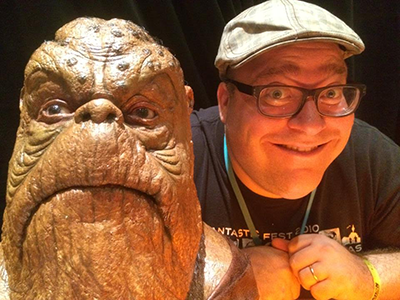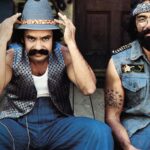One of my all-time heroes, George Carlin, was profiled in (of all places) the Sunday Times Style section. Nevertheless, the author got it. The article is reprinted without permission in its entirety below:
December 12, 2004
Cancer? Suicide? Politics? That’s Hilarious!
By WARREN ST. JOHN
FOR sheer energy, few performers perhaps few people can match George Carlin, the prince of outrage, a man for whom the hypocrisy of politicians, the callowness of the masses and of course the absurd details of modern life have served as comedic rocket fuel for more than 40 years. So it’s a little disconcerting when on a wet early winter day in Manhattan, Mr. Carlin shuffles into a Midtown hotel, unravels himself from his hat, coat, dark glasses and scarf, and rushes to sit down.
“I’m feeling a little wobbly,” Mr. Carlin said by way of explanation. “It’s this low blood pressure thing.”
At 67, Mr. Carlin is a survivor, though, he might add, barely. He has suffered three heart attacks “events,” he calls them and a number of angioplasties, so that these days, besides monitoring the world, he spends no small amount of energy monitoring fractionated cholesterol and lipids panels. Mr. Carlin has battled through cocaine addiction, a $3 million debt to the I.R.S. that took him 15 years to pay off, and in 1997, the death of his wife of 36 years from liver cancer.
None of which, it seems, has mellowed him. As much as ever, Mr. Carlin builds his humor around the taboo his current routine includes long riffs on cancer, natural disasters and teenage suicide and yet somehow manages to get laughs.
“Right now somewhere around the world, someone is about to kill himself,” Mr. Carlin declared cheerily toward the beginning of a sold-out show on Dec. 3 at the Westbury Music Fair on Long Island. “Every 30 seconds there goes another guy.” After pointing out that suicide was the third-leading cause of death for young men in the United States, Mr. Carlin told the crowd, “You gals, if you want to be truly equal, you’re going to have to start killing yourselves in greater numbers.”
“Somebody has to think about these things,” Mr. Carlin said under his breath later in the show, as he prowled the stage in his trademark black T-shirt, bluejeans and New Balance running shoes. “Apparently I’ve been appointed.”
Of course, Mr. Carlin appointed himself. Since at least 1973, when he performed his famous routine “Filthy Words,” describing the seven words you can never say on television, Mr. Carlin has made a point of saying things no one else would dare and mocking the sacred religion, patriotism and every conceivable political group and ideology. Along the way, he has managed to find the holy grail of show business: a constantly renewing audience, a steady stream of moderately disaffected people with a high threshold for being offended.
His shows he still performs roughly 150 times a year regularly sell out. Since 1977 he has performed a new HBO special every two years or so; his next is scheduled for November 2005. Mr. Carlin has published three best-selling books; his latest, “When Will Jesus Bring the Pork Chops?” has been on the New York Times best-seller list for six weeks. The book was taken off the shelves at Wal-Mart after complaints from customers about the cover, which shows Mr. Carlin in the seat normally occupied by Jesus in da Vinci’s “Last Supper.” (Mocking religion is a staple of Mr. Carlin’s repertory: he once proselytized for “Frisbeetarianism,” which held that when a person dies, “his soul gets flung onto a roof and just stays there.”)
“George has a vulnerability and a likability that lets him get away clean with saying certain things other people can’t say,” said Jerry Hamza, Mr. Carlin’s best friend and manager for more than 20 years, when asked how his friend had managed to keep his career going so long. “That’s where he lives he believes he can make anything funny.”
Mr. Carlin said the trick to enjoying his later years was caring less about things.
“I don’t have a stake in this adventure now the cultural, historical adventure of America and the biological adventure of this species on the planet,” he said. “I don’t care what happens to this country. There’s no changing the way this planet is headed. So I kind of watch it as entertainment.”
“I say it this way,” Mr. Carlin added. “When you’re born in this world, you’re given a ticket to the freak show. When you’re born in America you’re given a front row seat.”
For all his talk of disengagement, however, Mr. Carlin is by all accounts an obsessive worker. He splits his time between California and Las Vegas, and takes limousines over planes whenever possible, Mr. Hamza said, because he finds it easier to work on his laptop in a car. Mr. Carlin is constantly scribbling notions down in a notebook or recording them on a small voice recorder, and he spends most of his time typing, organizing and reorganizing his ideas in a library of 2,300 files he keeps on his computer raw material he may someday forge into actual jokes, monologues or material for his books. And as soon as he has recorded a new HBO routine, he begins cycling in fresh material, so that over the course of two years, his entire routine is replaced, and he’s ready to record another.
“It’s like a sock,” Mr. Carlin said. “I darn the sock so much that none of the original material is left. It’s the same sock it’s my show but the old material is gone.”
“I have no hobbies and I have no leisure activities,” Mr. Carlin added. “My greatest joy is working at the computer with my ideas.”
Mr. Carlin grew up on West 121st Street in Manhattan, with his mother, who worked in advertising and who left her hard-drinking husband when Mr. Carlin was 2 months old. He dropped out of school in the ninth grade and at 17 joined the Air Force, which stationed him in Shreveport, La., and set him to work repairing bombing systems on B-47’s. Mr. Carlin’s first job in entertainment was as a disc jockey at a station there.
Mr. Carlin still speaks adoringly of his mother and says that the stigma of having dropped out of school has fueled his career.
“When you quit school in ninth grade and you’re smart, you spend your life in some small or large way proving yourself,” he said.
Mr. Carlin worked comedy clubs, eventually found his way onto the variety show “Rowan & Martin’s Laugh-In” as a regular, and was the host of the debut of “Saturday Night Live” in 1975. He honed his personal style, blending quick and usually profanity-laced jokes with what he called style pieces, longer, carefully crafted monologues of high-speed word play meant to dazzle more than simply bust guts.
Along the way, Mr. Carlin addled during those years on cocaine courted controversy. He was arrested in Milwaukee on indecency charges after a show there in 1972. In 1973, his “Filthy Words” routine was aired on WBAI in New York City, resulting in an obscenity charge by the Federal Communications Commission against the station, which resulted in a long legal battle that eventually made it to the Supreme Court. (The court upheld restrictions on broadcasting profanities at times when children were likely to be tuned in.) The profanity in his routine limited his opportunities on network TV, but fortunately for Mr. Carlin, cable came along; he did his first HBO special in 1977. He had his first heart attack a year later.
Mr. Carlin said his material typically fits into three categories jokes about language, and about what he calls the small world and the big world.
“The small world is what’s in your refrigerator, how you drive, your pet’s behavior, your stuff,” Mr. Carlin said. “Those are things we share, that we all agree on. The large world is the big issues that will never be solved race, politics, government, religion, business, culture. That’s where I’ve headed more.”
Lewis Black, the comedian, said he believes Mr. Carlin’s longevity can be attributed to the themes of his work. “One of the major topics he deals with is timeless stupidity,” Mr. Black said. “It’s something everyone relates to. And he relates to his younger audience in terms of frustration and rage which appeals to them because young people live through an extended period of frustration and rage.”
Mr. Carlin’s books will not be confused with his routines for polish and forethought. Rather they are loose compendiums of the ideas many not fully formed that percolate through the more honed performances. His first, “Braindroppings” in 1997, was a surprise best seller. Helped perhaps by the Wal-Mart controversy, his new book made its debut at No. 5 on the New York Times best-seller list.
“I used to always describe myself as a comedian who wrote his own material,” he added. “Now I describe myself as a writer who performs his own material.” Mr. Carlin said that when he turns 70, he wants to begin work on a Broadway show not a one-man performance, but what he called a “single creature show” about growing up in Manhattan. “It would be a sweet reminiscence,” he said.
For now, there’s little that is sweet in Mr. Carlin’s comedic repertory. As much as ever, he mocks everything he can think of, it seems, including his audience. At his Westbury show, Mr. Carlin spewed venom at Americans with “short pants, fat thighs, dumb kids, eating corn dogs and triple cheeseburgers and fried butter dipped in cheese.” He looked up at the crowd and said, “That doesn’t include this audience.”
He also knows how to use an off-speed pitch. After a profanity-packed riff on a subject too vulgar for any newspaper, Mr. Carlin, hunched and prowling, peered up from the stage and asked, “You know what really gets me?” The audience braced itself for something truly outrageous. “I think there’s too many songs,” Mr. Carlin said, sounding for a moment like Jerry Seinfeld.
Pretty soon, though, Mr. Carlin had gone dark again.
“Most songs are love songs,” he said. “How about a song about cancer? I’d listen to that. Everybody’s got cancer in this country nobody’s singing about it.”







